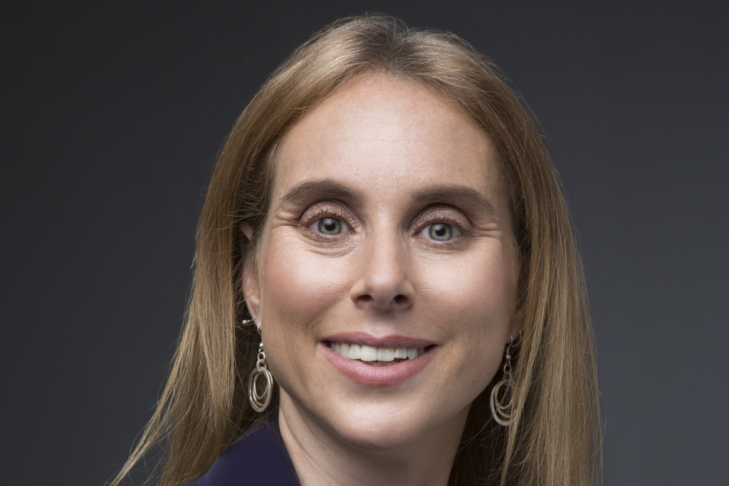Rabbi Jill Jacobs, executive director of T’ruah: The Rabbinic Call for Human Rights, was in Brookline last week to deliver the annual Cohon Memorial Lecture at Temple Sinai. T’ruah describes itself as mobilizing over 1,800 rabbis and cantors to protect human rights in North America and Israel. The organization’s name signifies a call to action—t’ruah is one of the blasts of the shofar heard on the High Holidays. Accordingly, the name symbolizes the shofar’s clarion call to justice, as well as the presence of the Divine.
Jacobs’ lecture was entitled, “How the Jewish Community Fights for Human Rights and Dignity.” However, woven throughout her talk was a d’var Torah, or commentary, on the week’s Torah portion—a portion that goes through the detailed steps of building a mishkan, or tabernacle. Like the Israelites, who had no experience building a mishkan, Jacobs asked her audience, “Do we have what it takes to move forward?”
Some of the interpretations around the Torah portion center on detailed instructions for building the mishkan. Various commentators distinguished between actually having the materials on hand and receiving them through divine intervention. In some instances, the tools were delivered with portions of manna. Moses tells the people that God has asked them to bring those gifts forward for the construction. Observed Jacobs: “This is not a group of people likely to build something that has never been built. This is a ragtag group brought out of Egypt. This is difficult. They are building a new sacred space. It is a new way of being with God and a new way of being with each other. This is a new world center.”
God, however, is confident that it takes just a single person to participate in this endeavor. The resources God has willed to the people enables each of them to do the work of the mishkan. In another midrash, or interpretation, Jacob anticipated this moment with the mishkan on his deathbed. He told his sons to gather building materials and to hold on to them for future generations.
Successfully building the mishkan happens through a combination of legacy and divinity. This combination also relates to the way Jews have survived these last two millennia. Jacobs asserted that Jews have a long historical memory. “We have always been on the edge of our seats waiting for times to change,” she said. She described the current moment as one of “moral crisis.”
“This is a time filled with anxiety,” she said. “Democracies are in the throes of nationalism and autocracy. Some of the institutions that have kept us safe aren’t as strong as we thought.”
Just as the Israelites drew on Jacob’s legacy, Jews can also draw on our faith tradition in this difficult time. Jacobs suggested three concrete ways. The first is to recognize that Jewish time is not linear. When we hold our seders next month, we will speak as though the Exodus happened to us personally. Jacobs further pointed out that we observe four fast days a year to mourn the destruction of the Temple, an event that took place almost 2,000 years ago. “It feels as though it was yesterday. We are living within the scope of history,” she said.
The second response is the obligation to take action. “We can’t wallow in the pain of the moment,” said Jacobs. “Our history of our past oppression compels us to stand with others who are experiencing oppression.” To that end, the Torah says at least 36 times to protect the ger, which Jacobs translated as “a person not from here but living among us.” In modern times, this means we must extend protection to the refugee or the immigrant.
Jacobs brought up another point about the timing of the commandment to protect the ger, or the stranger. “One of the first things that is said to a people who have made it out of a repressive situation is, ‘Don’t do this to other people,’” she said. “It would have been a perfectly normal response too for them to say, ‘Don’t trust anyone—keep outsiders out of the community.’ But the response is the opposite. Know what it is to be a foreigner.”
In the last couple of years, T’ruah has expressly fulfilled the commandment of protecting the stranger. The group has mobilized communities across the United States, Canada and Israel to respond to unprecedented attacks on immigrants and asylum seekers. In the last year, the organization put out a call to organize vigils and protests outside of ICE detention centers. Twenty-five rabbis and their communities in large and small cities answered the call. “We protest immigration laws because we would have liked to have fled to America during the Holocaust,” she said. “Because of that we do not discriminate against people due to place of origin.”
Jacobs ended her talk on an optimistic note. “Judaism,” she said, “gives us hope.”
“Part of the legacy of living in 2,000 years of history is that we don’t just look back, but we also look forward,” she said. “We are building toward a messianic era and we’re on a path to a better future. We find ways of working with our partners, new ways of taking action in a world that suddenly feels unfamiliar. Our work on the mishkan is still ever-present. We receive our tools through our legacy, or somehow find them every day. We have the knowledge and security that we are prepared to do this work.”



